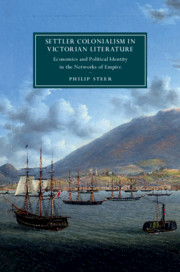 Settler Colonialism in Victorian Literature
Settler Colonialism in Victorian Literature The Invasion Novel, Geopolitics, and the Borders of Britishness
Published online by Cambridge University Press: 19 December 2019
This chapter argues that Australia and New Zealand versions of the invasion novel crystallized an indigenized, militaristic settler masculinity that soon proved adaptable to other geopolitical contexts. Novels such as George Ranken’s The Invasion (1877) and Kenneth Mackay’s The Yellow Wave (1895) defined settler masculinity by valorizing character qualities previously associated with indigenous colonial resistance. The global circulation of that formal logic, spurred by the Second Anglo-Boer War (1899-1902), can be seen clearly in the work of Erskine Childers: alongside editing a history of the war’s guerilla phase, he reworked the invasion novel in The Riddle of the Sands (1903) to imagine countering a threat of metropolitan conflict with a colonial mindset. In World War I, the Australian and New Zealand role in the Dardanelles Campaign was also celebrated in texts such as John Masefield’s Gallipoli (1916) as a settler invasion of Europe. Casting militarized settler masculinity as “surplus value,” highly valuable and yet disposable, constitutes one final intersection of political economy and literary form, colony and metropole, arising from the Victorian settler empire.
To save this book to your Kindle, first ensure [email protected] is added to your Approved Personal Document E-mail List under your Personal Document Settings on the Manage Your Content and Devices page of your Amazon account. Then enter the ‘name’ part of your Kindle email address below. Find out more about saving to your Kindle.
Note you can select to save to either the @free.kindle.com or @kindle.com variations. ‘@free.kindle.com’ emails are free but can only be saved to your device when it is connected to wi-fi. ‘@kindle.com’ emails can be delivered even when you are not connected to wi-fi, but note that service fees apply.
Find out more about the Kindle Personal Document Service.
To save content items to your account, please confirm that you agree to abide by our usage policies. If this is the first time you use this feature, you will be asked to authorise Cambridge Core to connect with your account. Find out more about saving content to Dropbox.
To save content items to your account, please confirm that you agree to abide by our usage policies. If this is the first time you use this feature, you will be asked to authorise Cambridge Core to connect with your account. Find out more about saving content to Google Drive.